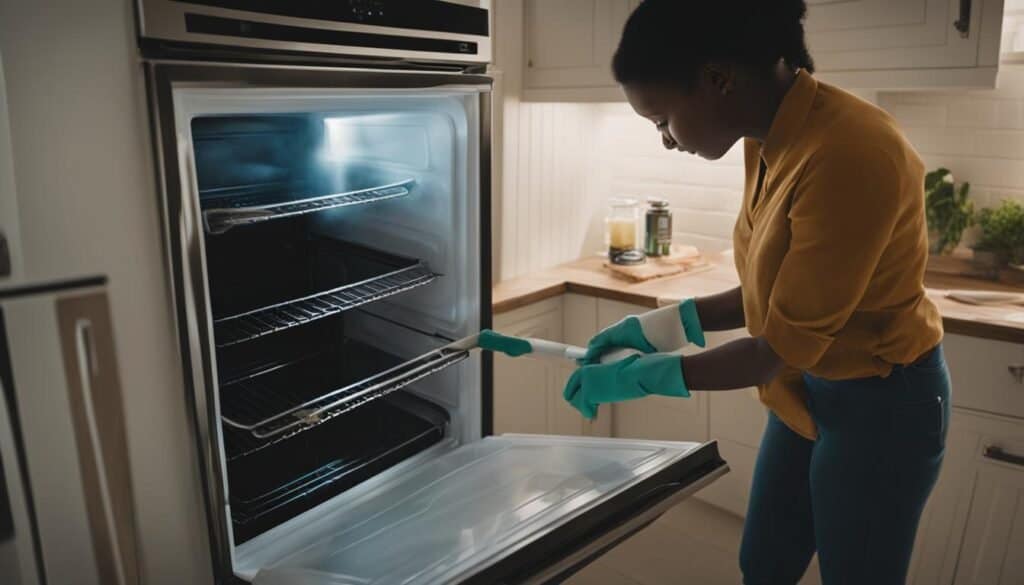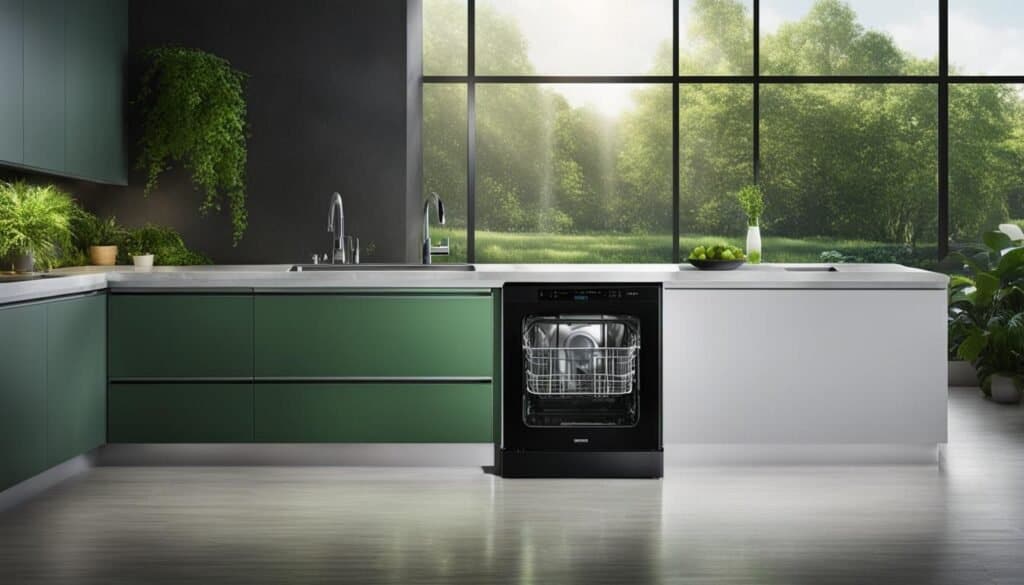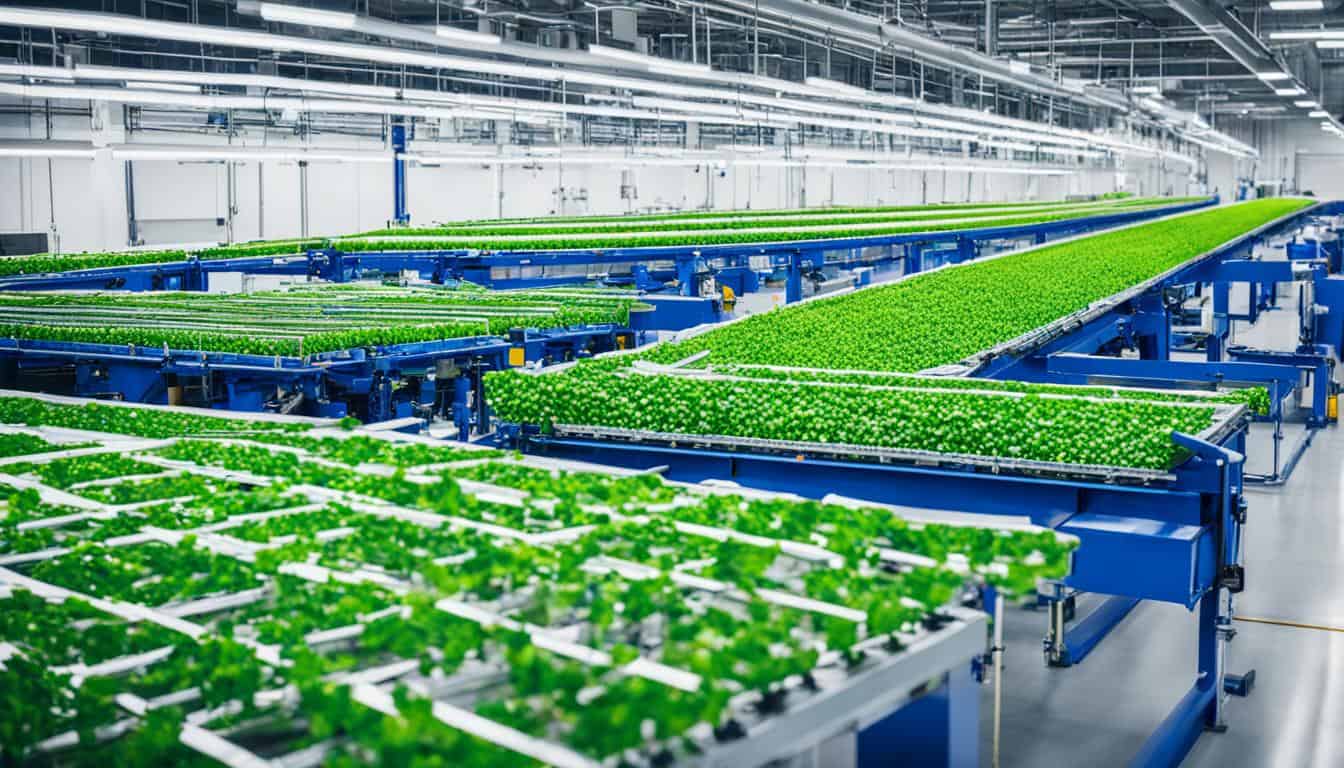As a central space in our homes, the kitchen is often a hub of energy consumption. With a few careful adjustments and upgrades, I have found it possible to transform my kitchen into an energy-efficient and eco-friendly hub that not only reduces my carbon footprint but also saves me money on utility bills. In this Energy-Efficient Kitchen Appliances Guide, I will share seven essential tips for a greener kitchen makeover that will help you lower your energy consumption and save money on utility bills.
Key Takeaways
- Switch to energy-efficient appliances to lower energy consumption and utility bills
- Optimize lighting for maximum energy savings
- Use smart power strips to prevent phantom energy use
- Seal gaps in your kitchen to conserve energy
- Choose efficient cookware for better heat retention and reduced energy use
- Practice energy-conscious cooking habits
- Leverage energy-saving features on your appliances for long-term savings
7 Tips for Energy-Efficient Kitchen Appliances
Here are some ideas to become more efficient in your home kitchen today:
1. Look for the EnergyStar label
When buying new appliances like refrigerators, dishwashers, and stoves, look for the EnergyStar label to ensure you are getting an energy-efficient model. According to the IEA, EnergyStar models are among the most efficient on the market. For example, an EnergyStar refrigerator uses up to 10% less energy than standard models.
2. Upgrade your oven
Consider upgrading to an oven with advanced energy-saving features like LG’s InstaView ThinQ range with Air Fry technology. This allows you to check on food without opening the door, reducing heat loss. The IEA reports that using an oven’s self-cleaning feature uses 6 kWh per hour cleaning cycle.
3. Install an aerator on faucets
Adding an aerator to sink faucets reduces water usage while still providing adequate water flow. Silicon Valley Power states this saves both water and the energy needed to heat that water. Aerators can reduce water usage by 30-50%.
4. Get an energy-efficient refrigerator
Upgrading to an Energy Star refrigerator can reduce energy consumption by up to 10%. Features like LG’s InstaView Door-in-Door provide easy access to contents without letting cold air escape. Older refrigerators use 72 kWh per month on average.
5. Use the right dishwasher cycle
Using the proper dishwasher cycle, like an eco setting, uses less energy and water compared to normal wash cycles. Dishwashers use 1-2.17 kWh per load on a normal cycle. An energy-saver cycle uses 0.5 kWh per load.
6. Clean refrigerator coils annually
Regularly cleaning dust buildup on refrigerator coils helps the compressor run more efficiently, reducing energy usage. Freezers use 44 kWh per month on average.
7. Limit oven preheating
Preheating the oven uses extra energy. For some recipes, you can turn on the oven closer to when you need it and reduce preheat time. Ovens use 2.3 kWh per hour when preheating.
Understanding Energy Efficiency in Kitchen Appliances
Energy efficiency plays a crucial role in minimizing the energy consumption of kitchen appliances, which subsequently reduces energy bills and lessens the environmental impact. By giving importance to Energy Star certifications and understanding an appliance’s power rating in kilowatts (kW), you can make more informed choices when purchasing energy-efficient appliances for your kitchen.
The Role of Energy Star Certifications in Home Appliances
Energy Star certifications are essential in identifying appliances that meet strict energy efficiency guidelines set by the U.S. Environmental Protection Agency. Appliances with the Energy Star label are proven to consume significantly less energy than non-certified counterparts, resulting in lower energy bills and reduced environmental impact. When shopping for new kitchen appliances, look for the Energy Star certification to ensure that the appliance is energy-efficient.
Determining the Appliance’s Power Rating in kW and Its Impact on Energy Use
Another critical element to consider when purchasing an energy-efficient kitchen appliance is its power rating, measured in kilowatts (kW). The power rating indicates the amount of energy consumed by the appliance per hour of operation. A lower kW rating signifies that the appliance uses less energy, thus helping you save on energy consumption and reduce your energy bills.
Department of Energy, it’s recommended to buy the most efficient appliances possible, including refrigerators, dishwashers, and stoves. Look for the EnergyStar label to ensure top efficiency.
Comparing the kW ratings of different appliances allows you to make smarter choices based on their overall energy efficiency. With a keen understanding of both Energy Star certifications and power ratings, your kitchen can become more eco-friendly, and you can enjoy long-term energy savings.
Strategies for Reducing Energy Consumption
With the growing concern for our environment and the need to reduce energy bills, it is essential to adopt strategies that help cut power consumption and promote smart usage of kitchen appliances. ‘Phantom’ energy use is one such factor to be vigilant about, alongside leveraging energy-efficient appliance features and maintenance practices for optimum performance.
How ‘phantom’ energy use affects your power consumption
‘Phantom’ or ‘vampire’ energy refers to the energy drawn by appliances even when they are not in use. This often-overlooked element can contribute to increased electricity bills and poses a challenge to energy conservation efforts. One effective countermeasure to prevent phantom energy use is to invest in smart power strips that cut off power to appliances when they are switched off.
Effective ways to cut your energy bill by smarter appliance use
Mindful usage of our appliances contributes significantly to energy savings. Some of the effective practices include:
- Setting appropriate temperature levels for your refrigerator and dishwashers to avoid unnecessary energy consumption.
- Taking advantage of energy-saving features such as programmable coffee makers and washing machines with eco-mode.
- Ensuring timely maintenance of appliances, such as regularly cleaning refrigerator coils and descaling dishwashers.
- Using lids on cookware to accelerate heating, minimizing the energy needed for cooking.
- Opting for energy-efficient kitchen appliances, such as ENERGY STAR-certified models, to minimize overall power consumption.
By adopting energy-conscious habits and maintaining vigilant upkeep of appliances, homeowners can optimize the efficiency of their kitchens and cut costs on energy bills while doing their part to protect the environment.
The Financial Benefits of Investing in Energy-Efficient Kitchen Appliances

When it comes to investing in energy-efficient kitchen appliances, the financial benefits are substantial and wide-ranging. Appliances that are certified by ENERGY STAR offer significant energy savings and can contribute to noticeably reduced utility bills. Although these appliances may come with a higher upfront cost, the long-term savings on energy expenses can more than offset the initial investment.
By choosing to invest in energy-efficient products, you actively help to conserve energy and lower energy consumption in your kitchen. This not only benefits your wallet by allowing you to save money, but it also contributes to a more sustainable living environment and better global energy conservation efforts.
Here are some key financial benefits to consider when investing in energy-efficient kitchen appliances:
- Reduced energy bills from lower energy consumption.
- Long-term savings that offset the initial higher cost.
- Increased property value due to eco-friendly installations.
- Potential tax credits and rebates from the government for utilizing energy-efficient products.
- Reduced maintenance costs, as energy-efficient appliances generally require less frequent repairs and replacements.
By making the switch to energy-efficient kitchen appliances, you not only invest in your financial security, but you also minimize your ecological impact. This is a win-win scenario that allows you to take responsibility for your energy usage while enjoying the benefits of a more efficient and cost-saving home.
Energy-Efficient Kitchen Appliances Guide
Navigating the myriad of kitchen appliances can be challenging, but with a comprehensive guide to energy-efficient kitchen appliances, homeowners can make informed decisions that align with their household needs. Key considerations include seeking out appliances with the ENERGY STAR label, which signifies appliances that use significantly less energy than standard models. By prioritizing energy-efficient dishwashers, refrigerators, and other appliances, families can enjoy the combined benefits of cutting-edge technology, practical utility, and optimized energy performance that cumulatively contribute to a more sustainable lifestyle.
To help you make the best choices for your home, here are some top-rated energy-efficient kitchen appliances to prioritize:
- Energy-efficient dishwasher: ENERGY STAR certified dishwashers use less water and energy than traditional models, resulting in both money and resource savings.
- Energy-efficient refrigerators: Look for models with a high-efficiency compressor, better insulation, and/or temperature management features to keep your food fresh while consuming less energy.
- Energy-efficient cooking appliances: Consider induction cooktops and convection ovens that offer faster, more even cooking with reduced energy consumption.
The best energy-efficient products are designed to help you save on energy and reduce your environmental impact. To maximize these benefits, proper use and maintenance of your appliances is essential. For example, avoid overloading your dishwasher or refrigerator, regularly clean your microwave’s air vents, and perform routine coil maintenance for your refrigerator. These practices extend appliance lifespan and keep them operating at peak energy efficiency.
Remember that a well-informed choice leads to a greener, more cost-effective kitchen that benefits both your wallet and the environment.
In conclusion, understanding energy efficiency and researching the most suitable appliances for your needs is paramount in creating an eco-friendly and economical kitchen. Keep the ENERGY STAR label and energy consumption benchmarks in mind, and always follow manufacturers’ guidelines for optimal use and maintenance. With this knowledge, you’ll be well on your way to a sustainable and budget-friendly home.
How to Properly Maintain Your Appliances for Energy Efficiency
Proper maintenance of kitchen appliances is essential for ensuring optimal energy efficiency. By consistently keeping your appliances in perfect working condition, you can enhance their performance, make them last longer, and reduce energy consumption. This section will discuss the importance of routine cleaning and professional maintenance checks for various kitchen appliances.

Routine Cleaning Tips for Peak Appliance Performance
Routine cleaning plays a crucial role in maintaining peak appliance performance. Some helpful tips include:
- Clearing refrigerator condenser coils of dust annually to ensure efficient heat exchange and energy savings.
- Descaling coffee makers and kettles regularly to eliminate limescale buildup and enhance their efficiency.
- Cleaning the stovetop, oven, microwave, and dishwasher regularly to prevent grease and grime from hindering their performance and causing energy wastage.
- Checking and replacing worn-out refrigerator door seals to maintain proper insulation and prevent energy loss.
Additionally, setting appliances at appropriate temperatures and leveraging energy-saving features can further contribute to energy efficiency. For instance, use the ‘eco’ mode in dishwashers or the ‘energy saver’ settings in refrigerators when applicable.
The Importance of Professional Maintenance Checks
While regular cleaning is essential, going beyond the basics and scheduling professional maintenance checks is also vital for maintaining appliance efficiency. Professional service technicians have the expertise to uncover and rectify potential energy-draining issues, ensuring appliances function effectively and cost-efficiently. Some of the benefits of professional maintenance checks include:
Preventive care that detects and resolves issues before they lead to energy-wastage or costly repairs.
Validation that your appliances are meeting energy-efficiency standards, as reflected in their energy labels.
Peace of mind knowing that your appliances are well-maintained, potentially extending their lifespan and saving you money on utility bills.
In conclusion, proper appliance maintenance is a critical factor in achieving energy efficiency. By routinely cleaning your appliances, setting accurate temperatures, utilizing energy-saving modes, and engaging professional maintenance checks, you can reduce energy consumption, save on utility bills, and enjoy reliable kitchen appliance performance.
Maximizing Your Refrigeration Efficiency
Boosting your fridge’s energy efficiency starts with selecting a model that has the best energy rating for its size that caters to your household’s needs without wasting energy. This, along with proper maintenance, facilitates optimal refrigerator performance, conservation of energy, and cost-effectiveness.
Choosing the Right Energy Rating for the Size of Your Refrigerator
An energy-efficient fridge not only consumes less energy but also significantly cuts energy costs. To find the most suitable refrigerator for your household, focus on the energy rating, which indicates the appliance’s energy consumption. Pick a model with a high energy rating that has adequate space to fulfill your storage needs while ensuring minimal energy use.
Maintaining Refrigerator Door Seals to Conserve Energy
Another crucial aspect of refrigeration efficiency is the proper maintenance of refrigerator door seals. Regular checks and maintenance of door seals help prevent cold air from escaping, thereby conserving energy and keeping costs low. Ensure you replace worn or damaged seals promptly to maintain optimal efficiency in your refrigerator, which will align with your energy-saving goals while minimizing energy consumption without compromising on food preservation.
Smart Cooking: Energy-Saving Tips for Stoves and Ovens
Efficient cooking practices generate a more eco-friendly kitchen and lead to considerable energy savings. By choosing the right appliances and adopting energy-saving techniques, you can reduce energy consumption without sacrificing the quality of your culinary experience.
Comparing energy use: Induction stoves versus gas and electric stovetops
Induction stoves are a highly energy-efficient alternative to traditional gas and electric stovetops. These appliances use electromagnetic technology to heat up only the cooking pan itself, minimizing heat loss and maximizing energy savings. By contrast, gas stoves and electric stovetops lose heat through conduction and radiation, leading to lower energy efficiency.
| Type of Stovetop | Average Energy Efficiency |
|---|---|
| Induction | 90% |
| Gas | 40-60% |
| Electric | 70-75% |
Insights on using less energy with convection and self-cleaning ovens
Convection ovens and self-cleaning ovens are known for their energy efficiency compared to standard models. Convection ovens use a fan to circulate hot air, effectively distributing heat and reducing cooking time. Self-cleaning ovens maintain clean, reflective surfaces, minimizing heat loss and enhancing efficiency. Both types of ovens use less energy than a standard oven, promoting energy savings in your kitchen.
While convection ovens can consume up to 20% less energy than a traditional oven, self-cleaning ovens may use up to 25% less energy.
- Invest in induction stoves to achieve greater energy efficiency and faster cooking times.
- Opt for convection ovens for even cooking and reduced cooking time.
- Choose self-cleaning ovens to maintain clean surfaces and minimal heat loss.
By understanding these differences in energy use and selecting energy-efficient appliances, you can significantly lower your energy consumption while delivering high-performance cooking results.
The Role of Energy-Efficient Dishwashers in Water Conservation
Energy-efficient dishwashers play a key role in conserving both energy and water. By adopting effective loading techniques and understanding the energy and water use implications of different dishwasher cycles, users can minimize the appliance’s operational footprint. In this section, we will discuss some practical tips to maximize the efficiency of dishwashers for an eco-friendlier kitchen.

Using less water and energy with effective loading techniques
One key aspect of water conservation is how you load your dishwasher. Loading dishwashers effectively ensures that each cycle is conducted with optimal efficiency. To maximize the appliance’s capacity, remember these essential tips:
- Load larger items like pots, pans, and platters on the bottom rack, making sure they do not block the water spray arms.
- Place smaller items like cups, glasses and bowls on the top rack.
- Angle dirty surfaces towards the center of the dishwasher for better water coverage.
- Avoid nesting and overlapping of dishes to ensure thorough cleaning.
By following these loading guidelines, you can get the most out of your dishwasher and reduce the need for additional cycles, ultimately saving energy and water.
Comparing energy and water use of dishwasher cycles
Understanding the energy and water use implications of various dishwasher cycles is crucial to making eco-friendly and cost-effective choices. Compare cycle options based on your appliance’s power rating and select those that conserve both energy and water. Here is a table illustrating the energy and water usage of some common dishwasher cycles:
| Dishwasher Cycle | Energy Use | Water Use |
|---|---|---|
| Auto or Sensor Wash | Varies, adjusts according to the load | Varies, adjusts according to the load |
| Normal Wash | Moderate | Moderate |
| Light or Eco Wash | Lower | Lower |
| Heavy or Pots & Pans Wash | Higher | Higher |
As seen in the table, the Auto or Sensor Wash cycle adjusts energy and water use according to the load, while the Light or Eco Wash cycle uses less energy and water compared to the Normal or Heavy Wash cycles. Choose the cycle that best suits your load and prioritizes energy and water conservation.
By using these tips, you can ensure that your dishwasher operates with maximum efficiency, ultimately reducing its impact on the environment and your utility bills.
Energy-Saving Laundry Appliances and Techniques
Embracing energy-saving laundry appliances and techniques significantly influences overall energy consumption in the household. Opting for washing machines with lower power and water use, and using air drying techniques over tumble dryers, can effectively conserve energy. Additionally, adopting smarter laundry behaviors, such as full loads and cold water cycles, further reduces the energy footprint of household laundry tasks.
Adopting these eco-friendly laundry practices plays a crucial role in preserving energy resources and managing utility costs. To make your laundry routine more energy-efficient, take note of the following tips:
- Choose ENERGY STAR-certified washing machines and dryers to ensure you are using the most energy-efficient appliances available.
- Wash clothes in cold water, which helps save energy and reduce energy bills.
- Use a high-speed spin cycle to extract excess water and reduce drying time.
- Take advantage of dryer sensors that detect when clothes are dry, automatically stopping the cycle and preventing over-drying, which wastes energy.
- Consider line-drying or air-drying clothes instead of using energy-consuming dryers when possible.
- Regularly clean lint filters for both washers and dryers to ensure optimal efficiency and reduce energy consumption.
By incorporating these energy-saving habits and using energy-efficient laundry appliances, you can make a significant impact on lowering your energy bills and conserving resources for a cleaner, greener home.
Cooling Systems: Air Conditioners and Their Alternatives
When it comes to creating a comfortable living environment, especially during the warmer seasons, cooling systems play a vital role. By upgrading to energy-efficient air conditioners and exploring natural ventilation alternatives, homeowners can enjoy significant savings on energy costs while not sacrificing comfort.
Upgrading to New Energy-Efficient Air Conditioner Models
Modern air conditioner models boast improved energy efficiency and performance compared to older units. By upgrading to a new energy star model, homeowners can take advantage of the higher SEER ratings for more efficient cooling capabilities. These energy-efficient air conditioners consume less energy, leading to lower home energy use and reduced utility bills, eventually resulting in substantial long-term cost savings.
Natural Ventilation and Its Impact on Lowering Energy Use
Natural ventilation serves as an eco-friendly alternative to mechanical cooling systems, effectively reducing reliance on air conditioners. Homeowners can open windows strategically to facilitate airflow, leading to a cooler living space and lower energy use. Additionally, considering proper shading techniques, such as window blinds and awnings, can further enhance cooling and prevent heat from entering the home. These methods, when combined with energy-efficient air conditioning systems, contribute to both energy savings and increased comfort during warmer months.
Smart Home Technologies: Integrating Efficiency into Daily Life
Smart home technologies have revolutionized the way we manage our energy consumption and contribute to a more energy-efficient daily life. These innovations, including smart thermostats and energy-efficient smart appliances, offer unprecedented control over energy usage while providing convenience and savings for homeowners.
The Convenience and Energy Savings of Smart Thermostats and Appliances
Smart thermostats are at the forefront of energy savings in modern homes. These intelligent devices allow users to automate temperature settings, track energy usage trends, and make informed decisions that reduce utility bills. Paired with energy-efficient smart appliances, homeowners can achieve remarkable reductions in energy consumption and monitor their progress through energy usage calculators, further encouraging eco-conscious habits.
By embracing smart home technologies, homeowners can effortlessly incorporate efficiency into their daily lives, paving the way for a greener and more sustainable lifestyle.
App-Based Monitoring and Control to Reduce Energy Consumption
App-based monitoring systems provide a user-friendly interface that allows homeowners to track and control energy consumption in real-time. With a plethora of customizable options and useful insights offered by these applications, you can make informed decisions that lead to more efficient usage of resources and, ultimately, lower utility bills. Integrating these technologies with energy-efficient smart appliances can dramatically transform one’s home into an eco-friendly haven without sacrificing comfort or convenience.
To truly harness the power of smart home technologies and achieve an energy-efficient lifestyle, it’s crucial to stay updated with the latest innovations, invest in smart appliances, and utilize app-based monitoring and control systems.
In conclusion, by integrating smart home technologies into our daily routines, we can achieve significant energy savings while enjoying a comfortable and convenient lifestyle. From smart thermostats to app-based monitoring and control, these innovations make energy conservation easy and accessible, ensuring a sustainable future.
Conclusion on Energy-Efficient Kitchen Appliances Guide
Embracing eco-friendly practices and adopting energy-efficient kitchen appliances is a key aspect to save money and reduce energy consumption in your home. This not only benefits your wallet but also contributes positively to the planet. As we’ve discussed in this energy-saving kitchen guide, going green starts with selecting certified, high-performance appliances, followed by proper usage and maintenance.
Upgrading to energy-efficient appliances, learning smart energy practices, and making responsible changes in consumption habits, will not only lower energy use but significantly contribute to overall energy efficiency at home. This proactive approach allows us to live a more sustainable, eco-friendly lifestyle while keeping costs low and minimizing the environmental footprint.
By following the guidelines outlined in this Energy-Efficient Kitchen Appliances Guide, you can remake your kitchen into an eco-conscious, sustainable space. This empowers you to embark on a path of sustainable living that leads to a brighter future for ourselves, our families, and generations to come. Let’s embark on this journey towards an energy-efficient, environmentally conscious, and cost-effective lifestyle, that supports a healthier, cleaner planet.
FAQ on Energy Efficient Appliances
Q: Why should I consider using an energy-efficient appliance in my kitchen?
A: Energy-efficient appliances will help you save on energy bills, reduce your carbon footprint, and can often outperform less efficient models. According to Energy Saving Trust, modern energy-efficient appliances use up to 20 percent less energy. This means you could save a significant amount over the appliance’s lifespan.
Q: Are there energy-efficient refrigerators available and how much energy can they save?
A: Yes, energy-efficient models are available for most types of household appliances, including refrigerators. Modern, more efficient models can use about 20 percent less energy compared to older, less efficient models, according to the Department of Energy. It’s also worth noting that newer refrigerator models not only save energy but also offer more features.
Q: Can using an oven consume much energy?
A: Yes, using an oven can consume much energy especially if it’s an older model or isn’t properly maintained. However, there are many simple and effective ways to reduce your oven’s energy consumption. One tip for using your oven more efficiently is not to open the oven door while it’s in use; each time you open the door, the oven loses heat and requires more energy to heat back up.
Q: Are there any reasons I might want to use a microwave or air fryers instead of an oven?
A: Microwaves and air fryers may run more efficiently than an oven and use far less energy. They use about 20 percent of the energy required by a full-sized oven. A microwave, for example, may have a power rating of 700w whereas an oven might have a rating in the 2-3kw range. Air fryers, on the other hand, rapidly circulate hot air to cook food and can do so with less energy.
Q: What are some tips for using a stove more efficiently?
A: There are many ways to make your stove use more efficient. Match your pot size to the burner size, since a 6-inch pot on an 8-inch burner wastes over 40 percent of the burner’s heat. Using a lid can also help retain heat, allowing you to reduce the stove’s temperature and conserve energy. Additionally, if purchasing a new stove, consider an efficient stove model which can be up to 20 percent more efficient.
Q: How efficient are energy-efficient dishwashers and how could they save energy?
A: Energy-efficient dishwashers could save you a significant amount of water and energy every wash cycle. They are designed to optimize water usage and have energy-saving features such as soil sensors, improved water filtration, and more efficient jets. The Department of Energy states that an Energy Star certified dishwasher can save as much as 3,870 gallons of water over its lifespan compared to hand washing.
Q: What should I consider when buying a new energy-efficient washing machine?
A: When buying a new washing machine, you might consider whether it is an energy-efficient model. These models use less water and energy, which can result in savings on your utility bills and is better for the environment. Whether choosing between a model that runs on electric or gas, be sure to check the energy efficiency rating.
Q: Can a water heater be an energy-efficient appliance?
A: Certainly, a water heater can be an energy-efficient appliance. Modern models are more energy efficient than their predecessors, and you can find the most energy-efficient models by looking for the Energy Star certification. Tankless water heaters are especially energy efficient as they only heat the water as you use it, limiting standby energy losses.
Q: What is the power rating of 700w on a microwave?
A: The power rating of 700w on a microwave refers to the microwave’s power output. A 700w microwave will use more power in a shorter amount of time compared to a microwave with a lower wattage, but will cook food faster. Power rating is a key consideration when choosing a microwave as it directly influences how quickly and evenly your food is cooked.
Q: How can cleaning my appliances make them more energy efficient?
A: Regular cleaning can significantly improve the efficiency of your appliances. For example, a dirty refrigerator may have to work harder (and thus use more energy) to maintain a cool temperature. Similarly, build-up in your dishwasher or washing machine can cause those appliances to run less efficiently. So, routinely cleaning your appliances can save you money on your annual energy costs and prolong the life of the appliances.
Source Links
- https://ecofreek.com/biodegradable/how-to-create-an-energy-efficient-kitchen-7-tips-for-a-greener-makeover/
- https://energy5.com/energy-efficient-appliance-maintenance-tips-for-optimal-performance
- https://usgreentechnology.com/7-smart-ways-to-save-on-electricity-bills-with-energy-efficient-home-appliances/





Leave a Reply